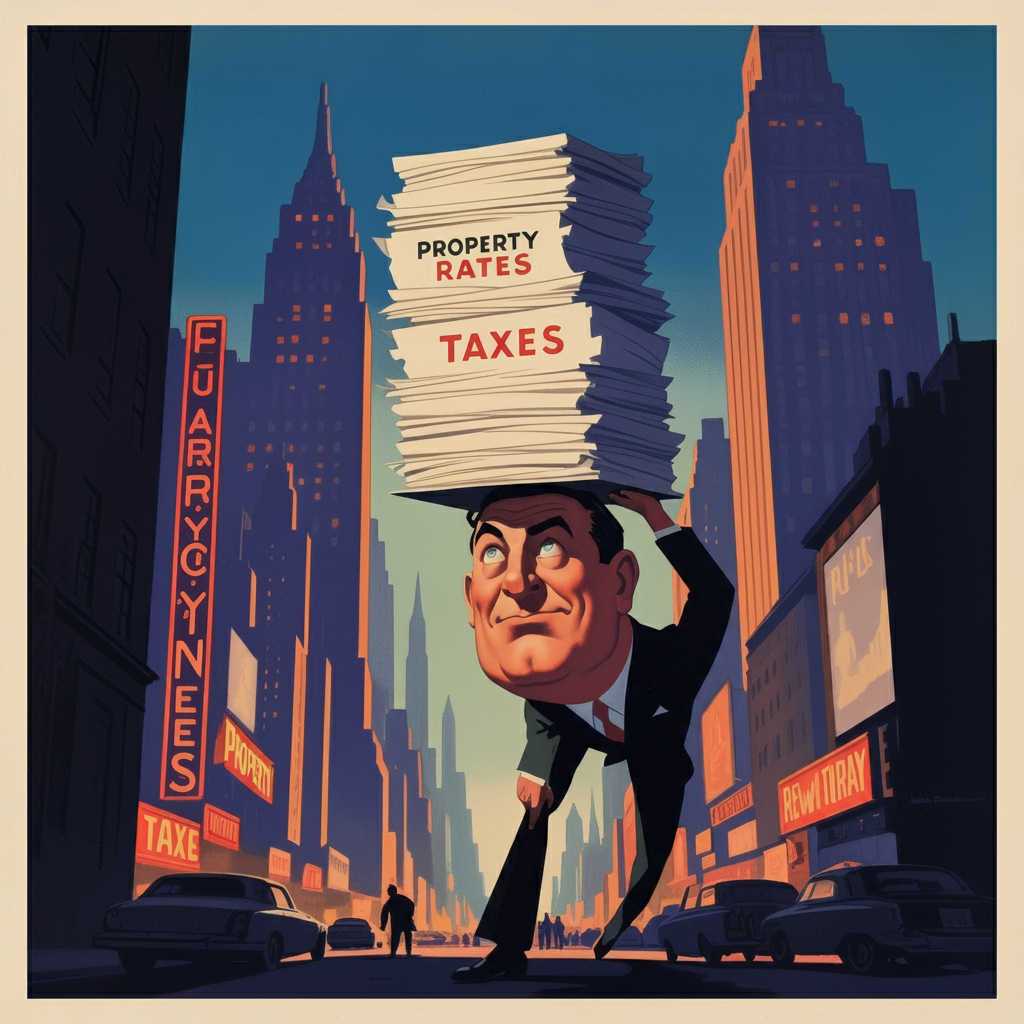Managing Property Rates and Taxes in New York’s Real Estate Market
1. Understanding the Role of Property Taxes
Property taxes are a crucial consideration for any real estate investment in New York. As a primary source of revenue for local governments, these taxes are based on the assessed annual rental value of properties. Unlike a direct payment for services, property taxes distribute the cost of public services across property occupiers in a community.
Fact: In boroughs like Brooklyn and Queens, property tax rates can vary significantly, influencing tenant willingness and ability to pay higher rents.
Understanding how local tax policies impact property values is essential for property managers. High tax rates can deter potential tenants, making some areas less attractive, especially during economic downturns. Visit NYC.gov for updates on property tax regulations.
2. How Property Rates Influence Investment Decisions
Property taxes can be a double-edged sword. On one hand, they fund vital public services like transportation and sanitation, enhancing property appeal. On the other, they can distort market dynamics, especially in high-rate areas. A well-known issue in New York is the discrepancy between rate-to-rent ratios (RRR), where some properties face disproportionate tax burdens compared to their rental income.
Example: Offices in Manhattan may experience a rate-to-rent ratio of 20%, while some properties in Staten Island face ratios exceeding 100%, impacting lease agreements and property values.
For investors, understanding these discrepancies is vital when deciding where to invest. High RRRs can reduce the potential rental income, making it harder to attract tenants, especially in areas where local governments are less favorable toward commercial ratepayers.
3. Strategies for Managing High Property Taxes
Property managers can implement several strategies to mitigate the impact of high property taxes. One approach is working with professional tax consultants to challenge property tax assessments. Many property owners overlook this, yet a successful appeal can significantly lower tax burdens.
Insight: Hiring a certified tax consultant can help identify discrepancies in property valuations, especially for older buildings or newly assessed commercial properties.
Additionally, keeping properties well-maintained and up-to-date can prevent inflated assessments. Regularly reviewing tax bills and staying informed about local government policies is crucial for staying ahead of potential tax hikes.
Top 15 Tips for Property Managers to Optimize Tax Efficiency
4. The Long-Term Impact of Property Taxes on Market Trends
Property taxes influence more than just immediate rental income; they shape long-term market trends. Areas with consistently high property taxes may develop negative reputations, leading to reduced demand and lower property values. This effect is more pronounced in commercial sectors, where businesses seek cost-efficient locations.
Case Study: In the early 1980s, areas like Tower Hamlets experienced reduced commercial activity due to skyrocketing tax rates, demonstrating the importance of balanced tax policies.
For property managers, keeping an eye on these trends can guide investment and divestment decisions. Proactive planning and collaboration with local economic boards can help mitigate long-term risks.
FAQs on Property Rates and Taxes in New York
Q1: How often are property tax rates reassessed in NYC?
A: Property taxes in New York are reassessed annually, with assessments based on the property’s market value and classification.
Q2: Can property owners appeal their tax assessments?
A: Yes, property owners can file an appeal with the NYC Tax Commission if they believe their property is over-assessed. Visit NYC Property Taxes for more information.
Q3: Are there tax incentives for eco-friendly buildings?
A: Yes, New York City offers various incentives for properties that adopt energy-saving technologies, such as the NYC Property Assessed Clean Energy (PACE) financing program. Additionally, federal tax credits may be available for renewable energy installations.
Q4: How do property taxes affect commercial lease agreements?
A: Property taxes are a significant factor in commercial lease agreements, often passed on to tenants through net leases. High taxes can make leases less attractive and impact a tenant’s decision to sign or renew a lease.
Q5: What strategies can be used to manage fluctuating property taxes?
A: Budgeting for potential tax increases, negotiating tax clauses in lease agreements, and actively monitoring local tax policies are effective strategies to manage tax fluctuations.
Q6: How does the rate-to-rent ratio (RRR) impact property investments?
A: A high RRR can make properties less attractive to tenants and investors. It’s essential to consider the RRR when evaluating investment opportunities to ensure sustainable rental income.
Q7: What happens if property taxes are not paid on time?
A: Unpaid property taxes can lead to penalties, interest charges, and even foreclosure in severe cases. It is crucial to pay taxes on time or negotiate a payment plan if necessary.
Q8: Are vacant properties taxed differently in New York?
A: Yes, vacant properties may be subject to different tax rates or penalties, particularly if they remain unoccupied for extended periods. Some local authorities impose higher rates on vacant commercial properties to encourage occupancy.
Q9: Can property taxes influence a business’s decision to relocate?
A: Absolutely. High property taxes can push businesses to relocate to areas with more favorable tax climates, impacting commercial property values and the local economy.
Q10: What role do property taxes play in overall property value assessments?
A: Property taxes are a crucial element in property value assessments. High taxes can reduce the net operating income (NOI) and, consequently, lower a property’s market value.
5. How Economic Factors Affect Property Taxes
Property taxes are not immune to broader economic trends. Inflation, government spending, and economic downturns all influence tax policies and assessments. During periods of high inflation, property taxes can rise significantly, putting pressure on both property owners and tenants.
Example: The 1970s and 1980s saw sharp increases in property tax rates, especially in urban areas like Manhattan, as local governments sought to balance budgets during economic crises.
Property managers must be vigilant and adapt their strategies in response to economic shifts. Diversifying property investments and maintaining a financial buffer can help weather economic uncertainties.
6. Collaborating with Local Authorities
Building relationships with local government officials and tax assessors can be beneficial. Property managers who are active in community meetings and economic boards can stay informed about upcoming changes in tax policies and advocate for fair tax practices. Engaging with community organizations also helps property managers anticipate future development projects that may influence property values.
Tip: Join local business improvement districts (BIDs) to stay engaged with community initiatives and gain insights into tax incentives for property improvements.
Participation in these discussions can also provide property managers with opportunities to influence zoning laws and advocate for policies that support real estate investment and development.
Additional Strategies for Tax Management






